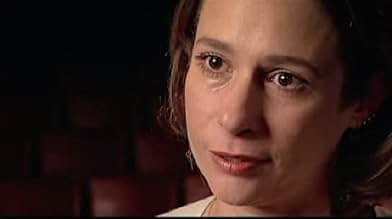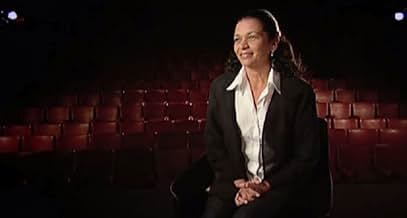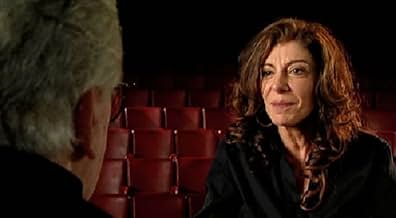Jogo de cena
- 2007
- 1h 40min
VALUTAZIONE IMDb
8,4/10
1411
LA TUA VALUTAZIONE
Aggiungi una trama nella tua linguaFollowing a newspaper ad, ordinary women tell part of their life stories to director Eduardo Coutinho, which are then re-enacted by actresses, blurring the barriers between truth, fiction an... Leggi tuttoFollowing a newspaper ad, ordinary women tell part of their life stories to director Eduardo Coutinho, which are then re-enacted by actresses, blurring the barriers between truth, fiction and interpretation.Following a newspaper ad, ordinary women tell part of their life stories to director Eduardo Coutinho, which are then re-enacted by actresses, blurring the barriers between truth, fiction and interpretation.
- Premi
- 11 vittorie e 6 candidature
Trama
Lo sapevi?
- QuizThe production company published a small newspaper ad asking women over 18 in Rio de Janeiro to tell their life stories for a documentary. 83 women answered the ad, 23 of them were selected and their interviews were filmed in June 2006 on the stage of Glauce Rocha Theater in Rio. In September, a few actresses re-enacted the interviews and commented on their approach, difficulties and doubts.
- ConnessioniFeatured in Eduardo Coutinho, 7 de Outubro (2013)
Recensione in evidenza
Just when Eduardo Coutinho's (semi)documentaries seemed to have become uncomfortably predictable -- when his personalist, inquisitive, biased, "screw-impartiality" style seemed to take over whatever reality he was investigating at the time -- "Jogo de Cena" arrives to show us that, at 74, he has found extra breath and is at the top of his game.
I have little to add to blur4fun spot-on comment here, except to say this is one of the wittiest formalist exercises on film structure in recent memory. It proves that imagination and intelligence can make seemingly ordinary material -- life stories told (or enacted) by women who may or may not be actresses -- rise to puzzling metalinguistic heights when cleverly rearranged and interconnected. It's also a well-humored investigation about the elastic boundaries of the eternal "truth or artifice" issue in the documentary form.
At first, what we see on the screen seems to belong to daytime TV slice-of-life talk-shows: people spilling out their personal dramas and tragedies. But, as in Jean Rouch's partly fake "Chronique d'un Été" and Orson Welles's landmark faux-documentary "F for Fake" (both seem to be influential here), somewhere along the way, we become mind- boggled: is that a "real life" woman or an actress? Who's the real "owner" of that life story? What is more important, to believe in the story or in the person who's telling it? Does the fact of suddenly realizing someone is acting out (and fooling us) prevent us from being moved by that story? Why do we take for granted that certain "formats" present the truth, like documentaries and one-on-one interviews?
By the end of "Jogo de Cena" (the title aptly refers to the theatrical world of make believe, and it's not by chance the single set is an empty stage), we realize -- with a smile -- that we've been had, and, though the film is strictly realistic in its visual style, it's a journey that can be as rich and fun as letting your mind be bent by a Cortázar story, a Robbe-Grillet novella, a Buñuel film or an Escher drawing.
"Jogo de Cena" comes out in the same year as remarkable Brazilian films like "Proibido Proibir", "Santiago", "O Ano em que Meus Pais Saíram de Férias", "Mutum", "Cidade dos Homens", "Saneamento Básico"; controversial ones like "Baixio das Bestas", "Cão sem Dono", "Estômago", "O Cheiro do Ralo", besides the box-office bulldozer (and winner of the Berlin Golden Bear) "Tropa de Elite". In the future, 2007 will have to be remembered as a very special year for Brazilian cinema.
I have little to add to blur4fun spot-on comment here, except to say this is one of the wittiest formalist exercises on film structure in recent memory. It proves that imagination and intelligence can make seemingly ordinary material -- life stories told (or enacted) by women who may or may not be actresses -- rise to puzzling metalinguistic heights when cleverly rearranged and interconnected. It's also a well-humored investigation about the elastic boundaries of the eternal "truth or artifice" issue in the documentary form.
At first, what we see on the screen seems to belong to daytime TV slice-of-life talk-shows: people spilling out their personal dramas and tragedies. But, as in Jean Rouch's partly fake "Chronique d'un Été" and Orson Welles's landmark faux-documentary "F for Fake" (both seem to be influential here), somewhere along the way, we become mind- boggled: is that a "real life" woman or an actress? Who's the real "owner" of that life story? What is more important, to believe in the story or in the person who's telling it? Does the fact of suddenly realizing someone is acting out (and fooling us) prevent us from being moved by that story? Why do we take for granted that certain "formats" present the truth, like documentaries and one-on-one interviews?
By the end of "Jogo de Cena" (the title aptly refers to the theatrical world of make believe, and it's not by chance the single set is an empty stage), we realize -- with a smile -- that we've been had, and, though the film is strictly realistic in its visual style, it's a journey that can be as rich and fun as letting your mind be bent by a Cortázar story, a Robbe-Grillet novella, a Buñuel film or an Escher drawing.
"Jogo de Cena" comes out in the same year as remarkable Brazilian films like "Proibido Proibir", "Santiago", "O Ano em que Meus Pais Saíram de Férias", "Mutum", "Cidade dos Homens", "Saneamento Básico"; controversial ones like "Baixio das Bestas", "Cão sem Dono", "Estômago", "O Cheiro do Ralo", besides the box-office bulldozer (and winner of the Berlin Golden Bear) "Tropa de Elite". In the future, 2007 will have to be remembered as a very special year for Brazilian cinema.
I più visti
Accedi per valutare e creare un elenco di titoli salvati per ottenere consigli personalizzati
Dettagli
Botteghino
- Lordo in tutto il mondo
- 226.783 USD
- Tempo di esecuzione1 ora 40 minuti
- Colore
- Mix di suoni
- Proporzioni
- 1.66 : 1
Contribuisci a questa pagina
Suggerisci una modifica o aggiungi i contenuti mancanti

Divario superiore
By what name was Jogo de cena (2007) officially released in Canada in English?
Rispondi



















